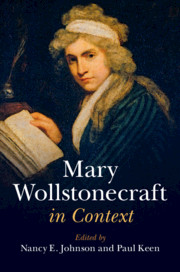Book contents
- Mary Wollstonecraft in Context
- Mary Wollstonecraft in Context
- Copyright page
- Contents
- Illustrations
- Notes on Contributors
- Preface
- Frontispiece
- Chronology
- Part I Life and Works
- Part II Critical Fortunes
- Part III Historical and Cultural Contexts
- The French Revolution Debate
- The Rights of Woman Debate
- Philosophical Frameworks
- Legal and Social Culture
- Literature
- Chapter 30 Sentimentalism and Sensibility
- Chapter 31 English Jacobin Novels
- Chapter 32 Anti-Jacobin Novels
- Chapter 33 Children’s Literature
- Chapter 34 Gothic Literature
- Chapter 35 Travel Writing
- Chapter 36 History Writing
- Chapter 37 Periodicals
- Chapter 38 Translations
- Suggested Further Reading
- Index
Chapter 32 - Anti-Jacobin Novels
from Literature
Published online by Cambridge University Press: 16 January 2020
- Mary Wollstonecraft in Context
- Mary Wollstonecraft in Context
- Copyright page
- Contents
- Illustrations
- Notes on Contributors
- Preface
- Frontispiece
- Chronology
- Part I Life and Works
- Part II Critical Fortunes
- Part III Historical and Cultural Contexts
- The French Revolution Debate
- The Rights of Woman Debate
- Philosophical Frameworks
- Legal and Social Culture
- Literature
- Chapter 30 Sentimentalism and Sensibility
- Chapter 31 English Jacobin Novels
- Chapter 32 Anti-Jacobin Novels
- Chapter 33 Children’s Literature
- Chapter 34 Gothic Literature
- Chapter 35 Travel Writing
- Chapter 36 History Writing
- Chapter 37 Periodicals
- Chapter 38 Translations
- Suggested Further Reading
- Index
Summary
The phrase “anti-Jacobin novel,” like “Jacobin novel,” was created by and has circulated in academic discourse since the 1970s.1 The phrase barely appears in the print record of Wollstonecraft’s day, and other terms were used to locate such fiction within a larger terrain of novelistic practice. A rare instance of “anti-Jacobin novel” occurred in the April 1800 issue of a short-lived magazine edited by the anti-reform propagandist Robert Bisset, who published his own “anti-Jacobin” novel, Douglas, the same year. The magazine’s essay on “The History of Literature for the Year 1799” continued three recent related projects. It treated current literature largely as opposition between what it called “Jacobin” and “anti-Jacobin.” It summarized the principles of political-cultural-literary critique mounted by the Anti-Jacobin Magazine, to which Bisset was a contributor. And the essay corresponded to verse satires such as William Gifford’s Baviad (1791) and Maeviad (1795) and Thomas Mathias’ The Pursuits of Literature (1794, expanded). These aimed, with some justice, to associate political and other kinds of reformism with literary avant-gardism and political with artistic “innovation.” In Bisset’s Magazine, “anti-Jacobin novel” referred to George Walker’s The Vagabond in discussion of prose and verse “Works of fiction.” After treating Charlotte Smith’s and Mary Robinson’s novels as “Jacobin,” the essay turned to their “anti-Jacobin” opponents, including Henry James Pye’s The Democrat (1795), Charles Lloyd’s Edmund Oliver (1798), Isaac D’Israeli’s Vaurien (1797), The History of Sir George Warrington; or, The Political Quixote (1797), and Walker’s The Vagabond (1799), concluding, “As novels have, of late, been frequently employed to make men disloyal subjects and bad citizens, we rejoice to see that good talents are now employed in the same way, to make men loyal subjects and good citizens.”2
- Type
- Chapter
- Information
- Mary Wollstonecraft in Context , pp. 273 - 280Publisher: Cambridge University PressPrint publication year: 2020



